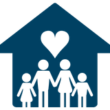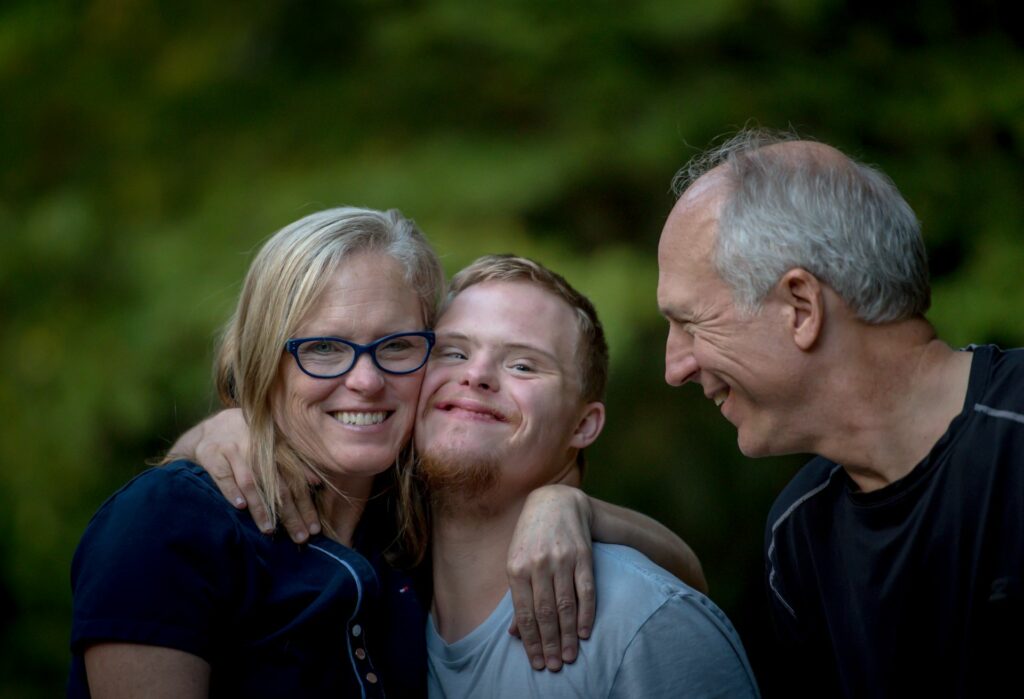
We are working with CoAbility to provide a home away from home for people with disability

The Disability Homestay Network (DHN) provides welcoming Short Term Accommodation (STA) and support for eligible NDIS participants.
The DHN program offers an alternative to traditional respite. Our goal is to create the perfect match between participants (your guest) and caring host families (that’s you!).
Our Standards are implemented across every placement to provide a benchmark of the services, quality, and safety required to deliver a positive STA experience for everyone involved.
All DHN stays are managed by the Australian Homestay Network (AHN).
Register to Host with DHN
Why You Should Become a Host

Our experienced team is with you every step of the way, with specialised 24/7 support available to hosts as well as guests and their families

AHN will use its unique matching system to connect guests with the host family that’s the best fit for them and for your household

Participate with peace of mind knowing that tailored insurance coverage and transparent payment processes are included in our service Standards


Key Hosting FAQs
If you meet the Eligibility & Registration criteria outlined in the Disability Homestay Network Host Agreement, you can apply to become a host.
We encourage diversity and welcome hosts who have different backgrounds, hobbies and interests and come from all kinds of households including families, couples, individuals and housemates.
You don’t necessarily have to have experience in supporting people with disability but you do need to be caring, positive, open-minded and willing to complete training to help you provide a great experience for your guests. Different levels of assistance will be required, so being flexible and mindful of each person’s needs is essential.
Yes, our approval process includes:
- an interview and home assessment
- NDIS Worker Screening (for new hosts) OR a National Police Check and Working With Children Check (WWCC) / Working With Vulnerable People (WWVP) check for all applicable residents in the host household according to local state/territory laws (for hosts already registered with the Australian Homestay Network) – Visit the Host Clearances page for more information
Hosts must also hold a valid First Aid certificate and have current CPR training if they wish to host a guest with High Support needs in the future.
It’s important to understand that each person is unique and their experiences differ – even if they share the same type of disability as someone else.
The NDIS supports people with physical, intellectual, cognitive, neurological, visual, hearing or psychosocial impairment/s and guests may fall into one or a number of these disability groups (learn more about Disability Types and Descriptions).
Each guest is unique so will require differing levels of support, such as:
Lower support needs
(no behavioural plans and ambulatory)
Assistance required – Routines, safety, meals, medication, transport to access the community, assistance with activities, e.g. electronics, games, gardening, cooking, hydration, turning on taps, cleaning, making the bed, tidying up, packing.
View more information about Lower Support Needs.
Medium support needs
(no behavioural plans and ambulatory)
Assistance required – Routines, safety, medication, eating, drinking, personal care, speech, hearing, vision, socializing, transport to access the community, higher level or complete assistance with activities, e.g. electronics, games, gardening, cooking, hydration, turning on taps, cleaning, making the bed, tidying up, packing.
View more information about Medium Support Needs.
High support needs
Assistance required – High levels of support for all activities and functions. Guest may have a behaviour support plan in place or be non-ambulatory. Host must have completed advanced training and hold a valid first aid and CPR certificate. Assistance with medication and manual handling may be required.
View more information about High Support Needs.
Our team will discuss each guest’s background and support needs during the placement process so you have the information you need to accommodate them and share a fulfilling homestay experience with them. We will advise if additional support will be provided during the stay to assist guests with High support needs.
Providing connection, inclusion, friendship and understanding is necessary for each and every stay.
The individual support needs of your guests will be communicated to you as potential placements become available. You might have to prompt a guest to take their medication or complete self-care routines like brushing their teeth, some may need help preparing their meals or getting in and out of bed, while others could require more intensive assistance getting around and performing day-to-day tasks. Your local office will fully brief you of the supports required to ensure you and your guest have a comfortable and enjoyable experience. If an external support worker is required, this will be arranged prior to the stay.
Each guest is unique so will require differing levels of support, such as:
Due to the personalised nature of the NDIS, host reimbursement rates vary depending on
Lower support needs
(no behavioural plans and ambulatory)
Assistance required – Routines, safety, meals, medication, transport to access the community, assistance with activities, e.g. electronics, games, gardening, cooking, hydration, turning on taps, cleaning, making the bed, tidying up, packing.
View more information about Lower Support Needs.
Medium support needs
(no behavioural plans and ambulatory)
Assistance required – Routines, safety, medication, eating, drinking, personal care, speech, hearing, vision, socializing, transport to access the community, higher level or complete assistance with activities, e.g. electronics, games, gardening, cooking, hydration, turning on taps, cleaning, making the bed, tidying up, packing.
View more information about Medium Support Needs.
High support needs
Assistance required – High levels of support for all activities and functions. Guest may have a behaviour support plan in place or be non-ambulatory. Host must have completed advanced training and hold a valid first aid and CPR certificate. Assistance with medication and manual handling may be required.
View more information about High Support Needs.
Our partners at Breakaway Retreats will assess the requirements of each individual participant during the booking process. DHN will advise potential hosts if additional support will be provided during the stay to assist guests with High support needs.
It’s important that we have a full picture of each guest’s requirements so they receive adequate care and support throughout the experience and you feel confident while hosting.
Guests and hosts create a profile upon registering with DHN. This gives us the essential information we need to set up a good match for both parties.
Some of the things we look at during the matching process:
Support needs / accessibility requirements (guest)
Location preferences (guest)
Host family preferences (guest)
Interests (guest and host)
Lifestyle (guest and host)
Goals and special requests (guest)
Host family info e.g. pets, age of residents, lived experience with disability/qualifications
Host preferences e.g. guest age, gender
We will check with you to ensure you are comfortable with a proposed placement before passing on your host profile to the guest. Please note that the guest must confirm they are happy with the match before we finalise the placement.
If your guest requires specific equipment or aids, our team will ensure this is delivered to your home prior to the guest’s stay. Directions and or training will be provided to you so you can assist the guest if needed.
Our team will take your home’s layout, facilities and accessibility into consideration when making a placement and will only place guests with you if we are confident you can meet their needs.
All hosts who successfully complete the Disability Homestay Network (DHN) host certification process are automatically covered under our tailored insurance policy. Guests are also covered for the duration of their stay.
Having appropriate insurance is a requirement under the Disability Homestay Network (DHN) Standards. The policy we have arranged provides liability insurance protection for you and your guests, as well as cover for guests’ belongings whilst in homestay.
Please visit our Insurance page for full policy details and more information regarding the DHN insurance program.
Yes, hosts receive a reimbursement to assist with essential expenses associated with hosting. The standard rate is approximately $350 per night, which generally covers a 24-hour period.
We will process host payments directly into your nominated bank account after we have received funds from the guest, usually within 30 days of your guest’s departure.
Any income you receive hosting for the Disability Homestay Network program will need to be reported to the Australian Taxation Office (ATO). We recommend speaking with a qualified accountant for information about your tax obligations and possible deductions you can claim for hosting.
Please visit the Host Payments page for more information.
We have support available 24 hours a day, 7 days a week. You can contact your local office at the Australian Homestay Network during business hours (9.00am to 5.00pm Monday to Friday, Australian Eastern Standard Time) or call our 24/7 call centre on 1300 69 7829 outside these hours.
Please visit the Host FAQs page if you would like further information about being a DHN host.